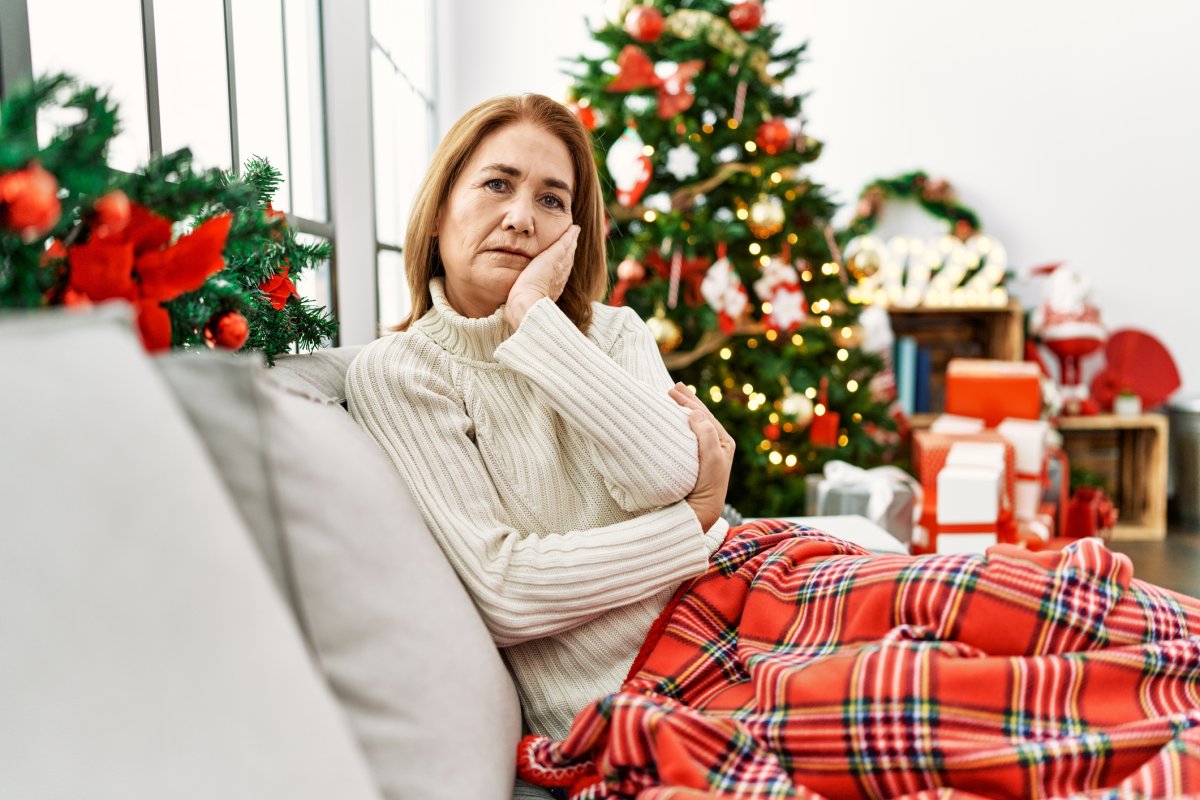The holidays are supposed to be a time of cheer and celebration. But a 2014 study from the National Alliance on Mental Illness found that 64 percent of Americans with a diagnosed mental health condition report feeling worse over the festive season.
"The holiday season beams a spotlight on everything that is difficult about living with depression," one of the participants said in the survey. "The pressure to be joyful and social is tenfold." Many reported feelings of fatigue, tension, loneliness, frustration, sadness and loss, which tend to be magnified during the week between Christmas and New Year's.
Niggling anxieties about how much money you have spent and how much chocolate you have eaten, combined with the cold reality of going back to work, can make this a difficult period for many. So why do we get post-holiday depression, and what can you do to beat it?

Ronnie Martin, an Ohio pastor and author, has written about feelings of anxiety during and after the Christmas period. "For me [the post-holiday blues] can begin on Christmas Day," he told Newsweek. "I've never been a huge fan of New Year's Eve/Day, so that is probably when my holiday blues hit their peak.
"Christmas is an escape from reality in many ways," Martin continued. "There is beautiful and nostalgic music playing all day. We are surrounded by whimsical decor.... January can be disorienting because it's back to business as usual and whatever troubles we are able to shelve in December come back with a bit of a thump."
Alex Douglas, a personal voice note artist and host of The Naked Narrator, said that for him the post-Christmas blues tend to come after the new year and can seem like "a purgatory period."
"I always feel like the post-holiday blues settle in at their strongest on [January 2]. The fact that family are traveling back home if they've come to visit, New Year's Day is out of the way," he said, means "you reflect on life."
Is Post-Holiday Depression Real?
Anxiety coach and psychologist Margaret Wehrenberg said that while it is difficult to get accurate statistics on how many people suffer from post-holiday blues, it is not an uncommon experience.
"From my own clinical practice, I can tell you that people who already experienced some anxiety or depression often feel that it gets worse around the holiday stretch from Thanksgiving through New Year's and into January," she said.
The exact cause of these feelings will vary from person to person, but often they are triggered by unrealistic expectations of what the holiday season should be like. "Post-holiday blues are often the result of failing to put boundaries on demands and then feeling sad about the outcome," Wehrenberg said.
Health psychologist Rae Mazzei said that festive overindulgence can also negatively affect our moods. "Overeating can lead to the post-holiday blues for numerous reasons," she said. "The physical effect of eating highly inflammatory foods, such as highly processed carbohydrates, can trigger weight gain, inflammation-related conditions, irregular sleep and metabolic dysfunction. In addition, the emotional effect of overeating often leads to guilt, remorse, regret and self-criticalness."
Annabelle Baugh, founder of Cosmetic Surgery Advancements, said this kind of overindulgence made the holidays difficult for her. "[My holiday blues] used to be a fear of putting on weight, as I was extremely body conscious.... But now I think it's almost ingrained in my brain that Christmas is a difficult and challenging time."
These feelings of guilt often get suppressed in the run-up to Christmas, but they come to the fore as the reality of New Year's resolutions looms. "All the fun is over, and now it's back to business as usual but your pants feel tighter," said Angela Ficken, a therapist who specializes in stress and anxiety. "It can be a hard place to be."

Excessive drinking can also negatively affect our mood, as alcohol consumption is linked to increased levels of stress hormones and disrupted sleep, both of which can influence our emotional states.
Mazzei said that the anticipation and experience of the holiday season can cause neurological changes as well. "When we engage in pleasurable events, such as a Christmas party, we frequently recall these memories and then miss these experiences. The brain responds to these stimulating experiences by triggering certain emotional states."
In the run-up to Christmas, anticipation for the big day releases a surge of dopamine in our brains, which triggers their chemical reward pathways. Eating sugary foods also releases dopamine, which further stimulates the brain's pleasure center. Unfortunately, once the holidays are over, these dopamine levels come crashing back down.
"Your brain feels an emotional letdown or slump," Mazzei said. "This can intensify after a holiday season if you were unfulfilled in your life before the holidays. The stark contrast of these experiences can trigger an adverse emotional reaction."
Post-Holiday Blues vs. Depression
While many of us might complain about feeling "depressed" after Christmas, the post-holiday blues are very different from clinical depression.
"Clinical depression differs from the post-holiday blues in severity, chronicity and symptoms," Mazzei said. "Clinical depression is a symptom found in multiple diagnosable mental disorders and typically includes a persistent low mood, significant impairment in daily functioning and low motivation. The post-holiday blues refers to a brief period in which you experience distressing emotions, negative thoughts and unhelpful behaviors after the holiday season."
While post-holiday blues are usually short-lived, clinical depression lasts much longer, Ficken said.

There are some similarities between the two, like feeling blue and lethargic. But Wehrenberg said that experiencing post-holiday blues is not as debilitating.
"A person with holiday blues may not feel like going to work but can do so and may want to binge-watch a TV series rather than get started on a school or work project, but generally can muster energy for necessary tasks, which a depressed individual may not," she said.
Does SAD Cause Post-Holiday Blues?
Seasonal affective disorder is a form of depression usually brought on by a lack of daylight during the winter months. There is no clear cause for SAD, although the lack of sunlight is thought to cause chemical changes in the brain that affect our levels of the mood-regulating hormone serotonin, according to a Johns Hopkins University health website.
But while SAD may contribute to your post-holiday blues, Ficken said, the two are not related. "The change in seasons can drastically impact mood where medications might need to be adjusted or started," she said. "Post-holiday blues is a letdown in mood but not a clinical condition."
Wehrenberg said that post-holiday blues are reported in countries in the Southern Hemisphere too, where Christmas falls during the summer.
"It is an accident of biorhythms—coupled with the reality of how dark affects both psyche and culture, coupled with how the Christian culture co-opted the winter solstice—that SAD and holiday blues coincide," she said.
How to Beat Post-Holiday Blues
For many people, post-holiday blues are about disappointment. You did not receive the gift you had been hoping for, or you spent weeks preparing a Christmas meal that no one appreciated.
In this case, Wehrenberg said, the best thing you can do is manage your expectations and ask your family ahead of time what they are willing to commit to. "Ask for what you want from your family. For example, that everyone will show up for brunch or go to midnight Mass even if they do not want to."
If you feel as if you have nothing left to look forward to, Mazzei said, it can help to refocus your thinking. "You may reframe the thought 'I have nothing to look forward to anymore' into 'Although I will miss the holidays, I'm grateful for the time I spent with my family and friends and I'll start planning my next holiday.'
"Be grateful for what you have now. Commit to plans in January and February. Think about what you value in life and create goals," she said.

Douglas said that he has found this strategy helpful. "I always remind myself of the things that are planned, like a holiday in the year ahead. I also like to check that everyone who visited got back home OK and call other members of the family and friends and see what they have planned.
"I keep a routine up too by still going to the gym or doing a workout in the morning so I don't feel out of place and even look ahead to the next Christmas and what could be planned for then."
Exercise and healthy eating can help beat the post-holiday lethargy, but you do not have to hit the gym every day or take up running to feel the benefits. Even going on a walk around the neighborhood or taking a light yoga class has been shown to boost people's moods.
When Baugh is feeling stressed, she tries to tell herself empowering messages to keep pushing forward. "I use positive affirmations which I say in the mirror every day," she said. "Anyone can benefit from doing this, and research shows that practicing self-affirmations has positive effects on the way the brain responds to stress.
"Additionally, I like to color in adult coloring books, which helps to calm me and helps me to be present."
Surrounding yourself with friends and family can be particularly important at this time of year, especially after a month of family festivities and Christmas parties. "We do better when we're surrounded by a community who will stand with us and encourage us through difficult times," Martin said.
Finally, Ficken suggested that if taking down your Christmas decorations makes your home seem bare and dark, you can leave them up a while longer. "Just because the holidays are over doesn't mean all the fun needs to come to a crashing halt," she said.
Update 1/11/23, 10:55 a.m. ET: This story was updated to include Alex Douglas' profession.
Is there a health issue that's worrying you? Do you have a question about mental health? Let us know via health@newsweek.com. We can ask experts for advice, and your story could be featured in Newsweek.
Uncommon Knowledge
Newsweek is committed to challenging conventional wisdom and finding connections in the search for common ground.
Newsweek is committed to challenging conventional wisdom and finding connections in the search for common ground.
About the writer
Pandora Dewan is a Senior Science Reporter at Newsweek based in London, UK. Her focus is reporting on science, health ... Read more
To read how Newsweek uses AI as a newsroom tool, Click here.






